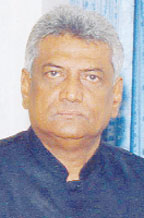The government is considering pulling the plug on GECOM’s Media Monitoring Unit (MMU)—a move it has been advised against in order to maintain a peaceful environment for polls.

Although no official decision has been conveyed to the Guyana Elections Com-mission (GECOM), its Chairman Dr Steve Surujbally has written Head of the Presidential Secretariat Dr Roger Luncheon, making a case for the continuance of the unit. In the May 11, 2010 letter, which was obtained by Stabroek News, Surujbally noted that the Chief Election Officer Gocool Boodoo indicated that there was doubt over continued support for the MMU. “…Please accept that we have invested too much in this Unit to allow it to collapse,” he wrote. “I am convinced that the function of the MMU, to a large extent is what allowed us to have a peaceful election in 2006. Even now the MMU keeps the media practitioners on the proverbial “straight and narrow path….”
A source familiar with the issue told Stabroek News that Surujbally has not received any response to his letter. He is said to be keen on maintaining the MMU, particularly with two elections due.
The operations of the MMU have been funded by the UNDP, as part of its democratic governance projects. Among its objectives are the monitoring of the media and reporting on breaches of the principles enshrined in the 2006 Media Code of Conduct and norms associated with international best practices in journalism; promoting the raising of professional standards in the media with regards to the reporting of political, electoral, governance and general social issues; encouraging equity, balance and fairness in news reporting; influencing media owners/operatives to abide by the principles enshrined in the Media Code of Conduct; and support GECOM’s Public Relations Department in information gathering and improving the organisation’s public image.
The UNDP has said that through the work of the MMU, GECOM has succeeded in bringing about “a more responsive media,” beginning with the development and implementation of a media code of conduct. Representa-tives of the private and state media recently signed on to an updated code, in anticipation of the holding of local government elections.
In his letter, Surujbally noted that the UNDP was coordinating a fund raising activity to ensure the MMU continued after the 2011 general elections into 2012. The government through Luncheon has already signed off on the MMU’s work plan for 2010, with a budget of US$130,557. The budgets for 2011 and 2012 are estimated to be similar, projected at US$270,000 over those two years.
Seeking support for the MMU, Surujbally urged Luncheon to recall that the MMU had sponsored the meeting that resulted in media practitioners writing their own Code of Conduct which is self regulatory. He noted that the methodology has proven itself to be very successful.
He noted too that Commonwealth Secretariat consultant Tim Neale had advised that the text of the Code is being used successfully elsewhere. Surujbally pointed to an OAS workshop in Washington in early May at which Guyana’s model of journalistic self-regulation featured prominently. Additionally, the MMU was also supposed to be examined at a special Commonwealth Secretariat meeting focused on, among other things, “The Media and Elections” in Accra, Ghana. “I am prepared to expand on the arguments which support my contention that the Media Monitoring arm of GECOM is vital for a peaceful political environment,” he emphasised.
At a meeting on self regulation last year sponsored by the Guyana Press Association and the Canadian High Commission, it was noted that the MMU had produced objective reports on media houses’ performance relative to the existing Code of Conduct and other relevant standards, during and since the 2006 election.





